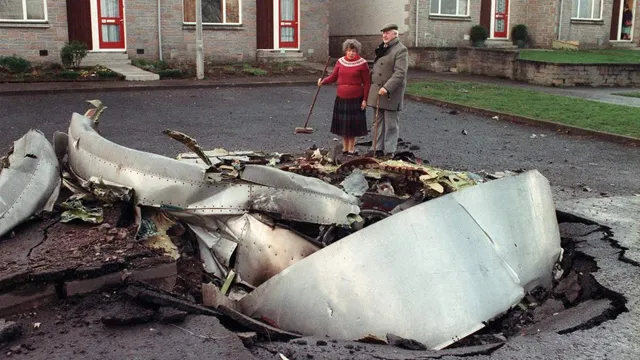
Scientists recover DNA from Lockerbie bomb suitcase after 37 years
2025-06-28 22:49- Scientists recovered a DNA sample from the suitcase involved in the Lockerbie bombing, which resulted in 270 deaths.
- The sample will be tested against a Libyan suspect currently facing trial in America.
- This advancement in evidence collection could influence ongoing legal proceedings related to a historical act of terrorism.
Express your sentiment!
Insights
In the tragedy known as the Lockerbie bombing, which occurred over Scotland in 1988, 270 people lost their lives when Pan Am Flight 103 was destroyed by an explosive device. This incident has long been a subject of investigation and has impacted the relations between the United States, the United Kingdom, and Libya, as a Libyan suspect has been identified in connection with the attack. Recent developments have emerged in June 2025, with scientists successfully extracting DNA from the bomb suitcase linked to this heinous act, which remained a crucial piece of evidence for decades. The DNA sample is set to be tested against the individual suspected of orchestrating the attack, as legal proceedings against this suspect continue in America, reopening discussions about justice and accountability related to this terrorist attack. This breakthrough could potentially offer new insights and evidence, paving the way for renewed legal actions and possibly a clearer path to accountability for those responsible for the tragedy that forever altered the lives of the victims' families and impacted international relations significantly. The long-lasting effects of this incident still resonate today, as it highlights ongoing issues related to terrorism, justice, and international cooperation in prosecuting such grave offenses.
Contexts
The Lockerbie bombing, which occurred on December 21, 1988, resulted in the tragic loss of 270 lives when Pan Am Flight 103 was attacked over Scotland. This horrific act of terrorism not only devastated families and communities but also had profound implications for international relations. The subsequent investigations revealed links to Libya and its leader, Muammar Gaddafi, which significantly altered the geopolitical landscape. The international community responded to the bombing with intense scrutiny and condemnation, leading to the imposition of economic sanctions against Libya. These measures aimed to pressure the Libyan government into complying with international norms and cooperating in the investigation of the bombing, marking a pivotal moment in global counter-terrorism efforts. In response to the Lockerbie incident, the United States and the United Kingdom spearheaded a rallying of international consensus against terrorism. The event propelled Terrorism as a significant issue on the global agenda, prompting multilateral agreements and enhanced cooperation among nations to address the threat. This shift included formal treaties aimed at criminalizing acts of terrorism and reinforcing extradition agreements. Furthermore, the bombing reinforced the necessity for improved airline security protocols, leading to enhanced regulations that impacted international travel and the aviation industry, thus reshaping domestic policies in various countries. The diplomatic repercussions of the Lockerbie bombing were extensive. In the years following the attack, Libya faced increased isolation from the international community, which significantly affected its economy and foreign relations. Libya eventually took responsibility for the bombing under international pressure, leading to a gradual thawing of relations with the West, characterized by a series of negotiations and concessions. This transformation illustrated how acts of terrorism could evoke a substantial response, altering the dynamics between nations based on compliance with international law and norms versus continued support for terror activities. The Lockerbie bombing's legacy persists in contemporary discussions on international terrorism and state-sponsored violence. It demonstrated the impact of terrorism on international relations and the necessity for cooperative global responses to such threats. While it took years for Libya to fully reintegrate into the global community, the initial reaction to the bombing set a precedent for subsequent international actions against terrorism. The incident underscored the delicate balance that nations must maintain when addressing security threats while fostering diplomatic relations, highlighting the ongoing challenges within international diplomacy and security cooperation.